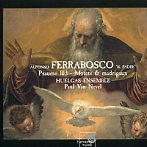You have to wonder why it’s taken so long for a world-class ensemble to devote a recording to the choral music of Alfonso Ferrabosco (1543-1588). Sure, his travels back and forth across Europe, the court intrigues, the scuffles with various royal and church authorities in England and Italy, his flight to France, his arrest in Bologna and the subsequent intervention by Catherine de Médicis may be worthy of a novel or film all on their own, but Ferrabosco’s music, much of it written while in England for both sacred and secular purposes, is quite fine, more than equal to that of several of his more illustrious contemporaries. And after all, anyone who influenced the style of Byrd and Tallis deserves scrutiny, if only to determine how extensively his own style–and thus, that of his English followers–was affected by his Italian roots.
The opening work, Dolci ire (“Sweet angers”), is an ideal example of Ferrabosco’s art. Although it’s a madrigal, it’s far from what we recognize as the Italian style characterized by Monteverdi or Caccini or Vecchi (although we do hear such an example later in Bruna sei tu ma bella–“You are dark but beautiful”). Rather, it presents a refined exterior with lovely, naturally flowing harmonies, straightforward rhythms, and beautifully designed, well-defined melodic lines that easily could exist in the context of a sacred motet. But careful listening reveals much more, including subtle dissonances, stealthy harmonic shifts and modulations, and facile rhythmic changes. We also can appreciate Ferrabosco as a master of melody who is skilled at creating chill-inducing, vibrant vocal harmonies, especially at important climaxes and endings. The sacred works, headed by the substantial Psalm 103, are equally impressive for their characterful text settings, sincere expression, uninhibited polyphony, and solid, satisfying homophonic passages.
The program’s highlights include the Psalm’s final “Cantate Domino” section and the motet Domine, non secundum peccata nostra, which, along with the opening Dulci ire is an unqualified masterpiece of the genre. Paul Van Nevel’s Huelgas Ensemble is a perfect advocate for these works–and for this composer–delivering each piece with fine-tuned vocalism and articulate expression, embodied in warm, clear, well-balanced sound in a comfortably resonant acoustic. Ferrabosco wrote dozens of motets, Lamentations, and madrigals, most of them still waiting their introduction to modern listeners. Perhaps this release will urge others to join in the re-discovery of a composer truly worthy of the effort. [9/2/2005]
































